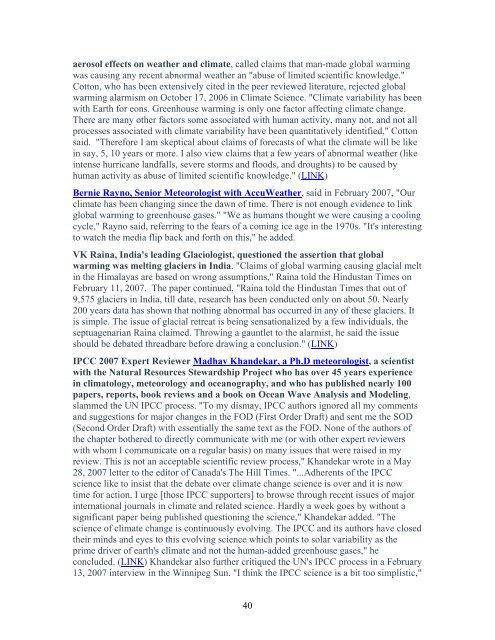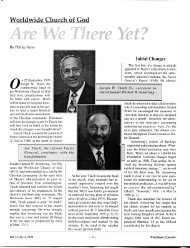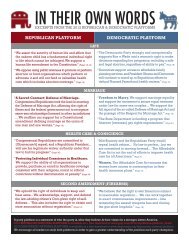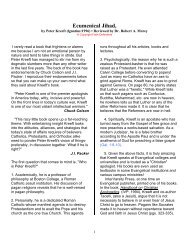U.S. Senate Report: Over 400 Prominent Scientists Disputed ... - NJIAT
U.S. Senate Report: Over 400 Prominent Scientists Disputed ... - NJIAT
U.S. Senate Report: Over 400 Prominent Scientists Disputed ... - NJIAT
Create successful ePaper yourself
Turn your PDF publications into a flip-book with our unique Google optimized e-Paper software.
aerosol effects on weather and climate, called claims that man-made global warming<br />
was causing any recent abnormal weather an "abuse of limited scientific knowledge."<br />
Cotton, who has been extensively cited in the peer reviewed literature, rejected global<br />
warming alarmism on October 17, 2006 in Climate Science. "Climate variability has been<br />
with Earth for eons. Greenhouse warming is only one factor affecting climate change.<br />
There are many other factors some associated with human activity, many not, and not all<br />
processes associated with climate variability have been quantitatively identified," Cotton<br />
said. "Therefore I am skeptical about claims of forecasts of what the climate will be like<br />
in say, 5, 10 years or more. I also view claims that a few years of abnormal weather (like<br />
intense hurricane landfalls, severe storms and floods, and droughts) to be caused by<br />
human activity as abuse of limited scientific knowledge." (LINK)<br />
Bernie Rayno, Senior Meteorologist with AccuWeather, said in February 2007, "Our<br />
climate has been changing since the dawn of time. There is not enough evidence to link<br />
global warming to greenhouse gases." "We as humans thought we were causing a cooling<br />
cycle," Rayno said, referring to the fears of a coming ice age in the 1970s. "It's interesting<br />
to watch the media flip back and forth on this," he added.<br />
VK Raina, India's leading Glaciologist, questioned the assertion that global<br />
warming was melting glaciers in India. "Claims of global warming causing glacial melt<br />
in the Himalayas are based on wrong assumptions," Raina told the Hindustan Times on<br />
February 11, 2007. The paper continued, "Raina told the Hindustan Times that out of<br />
9,575 glaciers in India, till date, research has been conducted only on about 50. Nearly<br />
200 years data has shown that nothing abnormal has occurred in any of these glaciers. It<br />
is simple. The issue of glacial retreat is being sensationalized by a few individuals, the<br />
septuagenarian Raina claimed. Throwing a gauntlet to the alarmist, he said the issue<br />
should be debated threadbare before drawing a conclusion." (LINK)<br />
IPCC 2007 Expert Reviewer Madhav Khandekar, a Ph.D meteorologist, a scientist<br />
with the Natural Resources Stewardship Project who has over 45 years experience<br />
in climatology, meteorology and oceanography, and who has published nearly 100<br />
papers, reports, book reviews and a book on Ocean Wave Analysis and Modeling,<br />
slammed the UN IPCC process. "To my dismay, IPCC authors ignored all my comments<br />
and suggestions for major changes in the FOD (First Order Draft) and sent me the SOD<br />
(Second Order Draft) with essentially the same text as the FOD. None of the authors of<br />
the chapter bothered to directly communicate with me (or with other expert reviewers<br />
with whom I communicate on a regular basis) on many issues that were raised in my<br />
review. This is not an acceptable scientific review process," Khandekar wrote in a May<br />
28, 2007 letter to the editor of Canada's The Hill Times. "...Adherents of the IPCC<br />
science like to insist that the debate over climate change science is over and it is now<br />
time for action. I urge [those IPCC supporters] to browse through recent issues of major<br />
international journals in climate and related science. Hardly a week goes by without a<br />
significant paper being published questioning the science," Khandekar added. "The<br />
science of climate change is continuously evolving. The IPCC and its authors have closed<br />
their minds and eyes to this evolving science which points to solar variability as the<br />
prime driver of earth's climate and not the human-added greenhouse gases," he<br />
concluded. (LINK) Khandekar also further critiqued the UN's IPCC process in a February<br />
13, 2007 interview in the Winnipeg Sun. "I think the IPCC science is a bit too simplistic,"<br />
40








